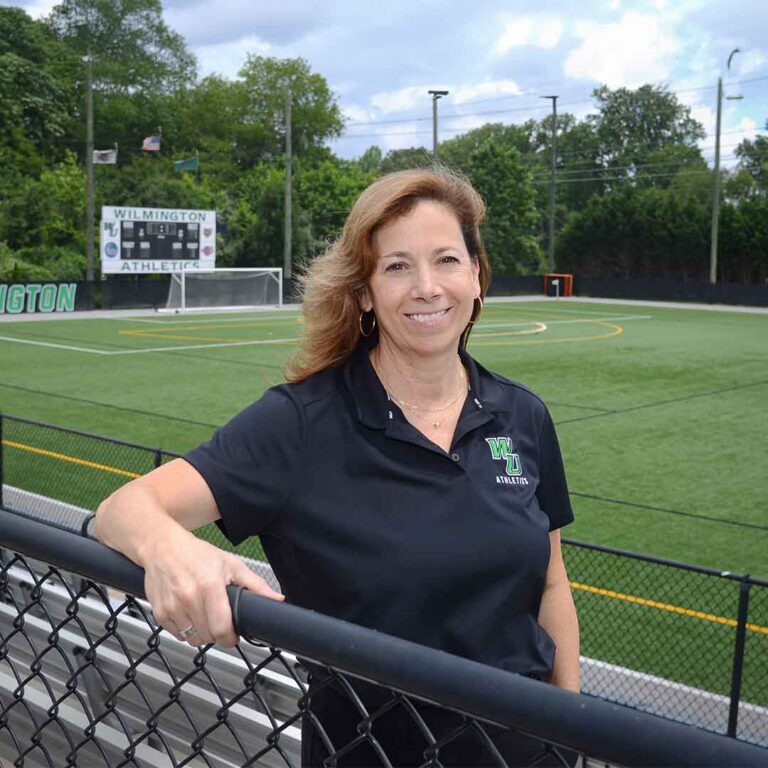To Test or Not to Test

Has overtesting in Delaware’s public schools reached its tipping point?
A growing number of Delaware’s public school parents are choosing to opt their children out of the SBAC achievement tests, a series of computer-based tests in mathematics and English language arts developed by the Smarter Balanced Assessment Consortium. This suite of tests is designed to measure an individual student’s mastery of the Common Core State Standards, and to provide a means of comparing the overall performance of groups of students, schools, districts and states. (Several states, but not a majority, are members of the Smarter Balanced Consortium and have adopted the tests. However, Delaware is the only state in the Mid-Atlantic region that is using the SBAC.) The results will also be used to assess teacher performance.
House Bill 50 was created last year to codify parents’ opt-out option for any state or district assessment. It was approved by large majorities in both the Delaware House and Senate but vetoed in July by Gov. Jack Markell. That set off one of the most heated education debates in recent Delaware history. Next month, when the General Assembly is back in session, the veto could be overturned.
The SBAC is merely the straw that broke the aging camel’s back. While Markell vetoed HB 50, he also signed Senate Joint Resolution 2, which aims to eliminate unnecessary, ineffective or redundant tests required by the state, districts and individual schools. And therein lies the problem: unnecessary, ineffective or redundant tests required by the state, districts and individual schools — otherwise known as overtesting.
Most would agree that overtesting has over-burdened students and exhausted teachers. But those who support the governor believe that the SBAC will provide quantitative evidence of where Delaware’s public school students stand among their national counterparts. (Private school students don’t have to take state tests.) HB 50 supporters are not anti-assessment, but they’re not sold on the SBAC either. They simply believe in parents’ right to choose which tests their kids should take.
The real questions are how much is too much, and who decides which tests render meaningful data. Wilmington University’s College of Education professors share the pros and cons of the SBAC and other assessments as they relate to academic success — and the overtesting that could undermine it.
The Pros
“In general, as College of Education professors, we support the idea and substance behind and process of the Common Core State Standards (CCSS), with the understanding that the CCSS have no testing or assessment requirements whatsoever,” says Dr. John Gray, dean of WilmU’s College of Education. “The standards address in some detail critical thinking and decision making that’s related to mathematics and English language arts. For the first time in this nation’s history, there’s a common set of standards against which every school in every district in every state can measure themselves. We think that’s a positive.”
In order for states to measure themselves against other states, a common assessment tool is needed and could result in real improvement in educational opportunities across the board. Those data can be worthwhile, says Al DiEmedio, director of teacher preparation programs. “It will inform instruction, or at least should inform instruction.”
Historically, standardized tests have imparted valuable information. When No Child Left Behind (NCLB) went into effect in 2002, there was a focus on testing every student, even those who were falling through the cracks. Professor Donna Mitchell says, “It changed the curriculum that all groups of students were being exposed to and allowed to participate in and it changed behaviors with regard to teaching practices and program structures they were afforded.”
That mattered to groups that had been underserved or misunderstood. According to Phi Delta Kappan magazine’s 47th annual PDK/Gallup Poll, African-American parents advocate standardized testing more than other groups. “They support the schools,” says Dr. Olivia Roane, assistant professor and assistant chair. “They tend to trust the people who lead them and believe those people care about their children.”
Indeed, Gov. Markell has garnered support from several leaders of minority organizations, including Deborah Wilson of the Metropolitan Wilmington Urban League; Maria Matos of Latin American Community Center; Raye Jones Avery of the Christina Cultural Arts Center; and New Castle County Councilman Jea P. Street. In their collective letter supporting Markell’s veto, they wrote: “If too many children opt out, we’ll lose perspective on how our children are doing with achieving the proficiency most important to succeeding in today’s world. We’d risk being unable to make meaningful demographic comparisons and track progress in relationship to other schools, districts, states and countries.”
The SBAC is considered to be an example of “next generation” tests. It forces students to make decisions and solve problems, proving a mastery of the Common Core Standards that Delaware adopted in 2010. According to its website, the Common Core is a set of academic standards in mathematics and English language arts/literacy created to ensure that all students graduate from high school with the skills and knowledge necessary to succeed in college, career and life, regardless of where they live. Forty-two states, the District of Columbia, four territories, and the Department of Defense Education Activity have voluntarily adopted and are moving forward with Common Core.
More than 10 million students nationwide were given the SBAC last spring. Results were mixed. Half of Delaware’s public school students were proficient in English and fewer than four in 10 were proficient in math. Yet many expected it would be worse. “The Smarter Assessment is harder and different from any of our past state assessments,” Markell told a News Journal reporter. “Although we raised the bar considerably, our students performed better than anticipated.”
Smart teachers cater to students’ needs, says Michael Curry, assistant chair of teacher preparation. “So at the classroom level, test results very much inform how they teach. That was the purpose behind the SBAC. It was designed to help teachers be better, and that, at its core, is the nature of assessment.”
The results of the first SBAC arrived in September, after school had started. But good teachers are adaptive and flexible. They can change lesson plans mid-stream. Dr. Stephanie LoBiondo, chair of WilmU’s school counseling program, says that school counselors and special-education coordinators also interpret data to better serve children.
The Cons
The problem with the SBAC, the professors say, is that it pits school against school and state against state. “It should be used to determine where individual students are and where instruction is necessary for them to improve,” says Gray. “But to say that test results alone show that this state is better than that state; this teacher is better than that teacher; or this student is better than that student: that’s something we completely reject.”
Those comparisons may prove challenging anyway since no other Mid-Atlantic state is using the SBAC. “A majority of the SBAC states are in the West, where populations of students might be a bit different than those in this area,” says Gray.
There’s also a flipside to receiving too much data. New teachers tend to be better at doing data analysis than veteran teachers, simply because newer teacher preparedness programs include data training to combat the data tsunami that teachers will likely face as standardized tests become more technologically sophisticated. All of WilmU’s educator preparation programs include statistics and assessment course work, and 36 percent of all early career public school teachers in Delaware hold degrees from WilmU. The university produces more teachers for Delaware public school classrooms than the University of Delaware, Delaware State University and Wesley College combined.
Another concern is the stress that students are exhibiting. When she was a school counselor, LoBiondo ran numerous test-anxiety groups to help kids deal with overtesting. (School nurses do the same.) Other students can’t handle the SBAC’s technical requirements. “They have to scroll not just up and down when reading, but left and right,” DiEmedio says.
Some say that there is no real incentive for students to take the SBAC seriously. “I know of middle school principals who are given instructions to tell students prior to taking it that the result will not have any consequences or affect their grades, nor will it have any effect on graduation,” says Curry. “So what does a typical eighth-grader do? Not much.”
According to the aforementioned Gallup Poll, 64 percent of parents nationwide think there’s too much emphasis on standardized testing. “The issue that I have is that so much energy is consumed with preparing for testing that the things that I think are really the spirit and heart of schooling have been sacrificed: extracurricular activities, the arts, athletics, clubs,” says Gray. “We find a greater sacrifice of these things in poorer communities than in wealthier communities. At private or wealthier schools, students spend about three times as much time enjoying special activities, yet have very little standardized testing. Those kids seem to do OK in college.”
Gray calls it a class war. “I think it’s discriminatory,” he says. “The poorer you are, the less opportunity you have to engage in challenging academic and extracurricular activities. And that’s what school is all about.”
Roane explains that minority parents support standardized tests because “they want to be in agreement with what’s happening in the schools,” she says. “They want the data from the SBAC because it tells them where their children are in relation to other children.”
Most parents want to know how their children are doing. But with every test a child takes, it’s that much more time away from electives that once enriched educational experiences. Gray, who was a principal for 25 years, remembers when one of his schools offered an outdoor experience program. “You take kids from a poor neighborhood who’ve never been on a mountain before and teach them how to ski,” he says. “When they master that mountain, they think they can master anything. It empowers them. And that carries over to everything they do. But if all you do is give them a test, and tell them they’re a number four and somebody else is a number two, how does that build their confidence? How does that develop their sense of value and importance?”
Overtesting can have a devastating impact on the art of teaching. People embark on the profession to inspire class discussions and share their knowledge of the world. But the SBAC takes up much of their time, forcing them to read scripts from manuals instead of conducting stimulating and engaging learning activities. One-fifth of a Delaware teacher’s evaluation is based on standardized test scores. “That means it’s one of five components, but it’s also a gatekeeper,” says Tyler Wells, chair of clinical studies at WilmU. “You can’t earn an effective or highly effective teacher rating if those growth component scores don’t increase.”
Teachers tend to be comfortable with the other four components — planning, instruction, management and professional growth — but the angst comes when they’re held responsible for things they can’t control. Variables like poverty, homelessness and hunger have plenty to do with student learning, and can have a powerful effect on achievement test scores.
The SBAC is given yearly to students in grades three to eight, then again in junior year. If it were the only test, it would likely be less controversial. “But districts have adopted myriad other tests and assessments in addition to the SBAC, which contributes to the overtesting issue,” says Mitchell. High school kids also have to worry about midterms, finals, PSATs, SATs — not to mention getting into college.
There are better ways to measure what a child learns, says Gray. “I believe that teacher judgment is probably the best form of assessment there is. I trust the judgment of professional educators much more than an assessment instrument that tries to reduce learning to a number. So the SBAC is a way, but it’s not the only way.”
Federal funding is also tied into the SBAC, and a certain percentage of Delaware public school students have to take it or funding can be withdrawn. So far, that hasn’t happened in Delaware. “Initially almost all states signed on to the Common Core State Standards and almost all the states signed on to choosing one of the two tests, the PARCC (Partnership for Assessment of Readiness for College and Careers) or the SBAC,” says Gray. “However, in the past year, many of those states have withdrawn. They are not going to participate. So it’s no longer possible to get an accurate, complete and comprehensive comparison of scores state to state.”
Some states are giving their own assessments and some are not. Combined with the opt-out movement, that could make it difficult to measure student performance on the national scale.
The General Assembly
Next month, the General Assembly could overturn Markel’s veto of HB 50. Gray predicts it will, since the Legislature will try to reflect public opinion. Other COE professors think the veto will stick, largely because it’s tied to federal funding.
Regardless, legislation won’t motivate high school juniors to perform well on the SBAC. And what they don’tknow can hurt them. According to the SBAC website, “High school students who take the Smarter Balanced exam in California, Delaware, Hawaii, Oregon, South Dakota and Washington could enter postsecondary institutions and directly enroll in credit bearing courses.” Some colleges will accept SBAC scores in lieu of placement exams for incoming freshmen. And, says Gray, if a junior gets a high score on the SBAC, his or her admission into a Delaware college is practically guaranteed.
Delaware students will still take the SAT. But a good SBAC score could be a game changer. WU
The Delaware PTA Speaks
WilmU alumna, Dr. Terri Hodges is president of the Delaware PTA. Her support of HB 50 has been widely publicized. She shares the PTA view with her alma mater:
• Standardized assessments can be a valuable tool in assessing student growth, providing that they provide useful instructional feedback, are developmentally appropriate and given in moderation. What we see happening in public education is an increase in using assessment data to label and punish our schools and teachers.
• The increased emphasis on high stakes testing has definitely changed the classroom environment from one of enrichment and learning to one that resembles an assembly line, with a drill and kill environment.
• The overemphasis on high stakes testing has attacked student morale at its core. They are no longer encouraged to be free thinkers. They are taught strategies to pass a test to the exclusion of everything else.
• Using test scores as the primary accountability metric for teacher evaluations falsely assumes that teachers have direct control over the assessment outcomes and ignores other critical factors such as a student’s socio-economic status, disability status and home environment, among other things.
(Dr. Hodges’s views do not necessarily reflect those of the COE professors or Wilmington University.)



